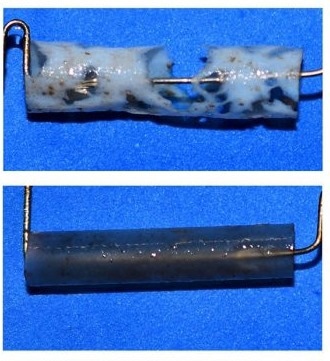
After 16 weeks in seawater, bioplastic straws made of foam (top image) broke down at least twice as fast as the solid versions (bottom image). Image Credit: ACS Sustainable Chemistry & Engineering
In response to plastic pollution, some US regions have imposed restrictions on traditional polymers like polypropylene (PP) in drinking straws, leading to an increasing demand for single-use items made from paper or bioplastics. However, it is crucial for replacement materials to maintain functionality during use and yet break down later in soil, freshwater, or saltwater.
While the next generation of bioplastics, such as cellulose diacetate (CDA) and polyhydroxyalkanoates (PHA), may meet both criteria, little is known about their longevity in the ocean compared to other materials.
To address this, Bryan James, Collin Ward, and their team conducted experiments using real seawater to examine the environmental lifetimes of different straws and explore ways to expedite the breakdown of next-generation bioplastics.
In the preliminary experiments, the researchers obtained inch-long segments from commercially available straws composed of coated or uncoated paper, PP polymer, as well as CDA, PHA, or polylactic acid (PLA) bioplastics. Subsequently, these segments were suspended on wires within large tanks where seawater at room temperature flowed through them.
The team observed that after 16 weeks, paper, CDA, and PHA straws experienced a weight loss of 25-50% from their initial weights. The researchers estimated that these degradable straws should completely disintegrate in coastal oceans within 10 months for paper, 15 months for PHA, and 20 months for CDA.
Furthermore, the biofilms on the disintegrating samples contained microbes known to metabolize various polymers. In contrast, PP and PLA straws showed no measurable weight changes, indicating that they could persist for years in ocean water.
Under the same experimental conditions, the researchers proceeded to investigate how altering the structure of the CDA material, transitioning from solid to foam, affected the environmental lifetime of the bioplastic.
They observed that the CDA foam disintegrated at least twice as quickly as its solid counterpart. The team estimated that a straw crafted from the prototype foam would break down in seawater in eight months — the briefest lifetime among all materials tested.
With evidence that certain bioplastic straws are unlikely to remain intact over an extended period, the researchers recommend simple adjustments, such as adopting foam materials, to further reduce this timeframe.
The study received funding from Eastman. Some authors are employees of Eastman, a manufacturer of biodegradable plastics.
Journal Reference
James, B. D., et al. (2024) Strategies to Reduce the Environmental Lifetimes of Drinking Straws in the Coastal Ocean. ACS Sustainable Chemistry & Engineering. doi.org/10.1021/acssuschemeng.3c07391.